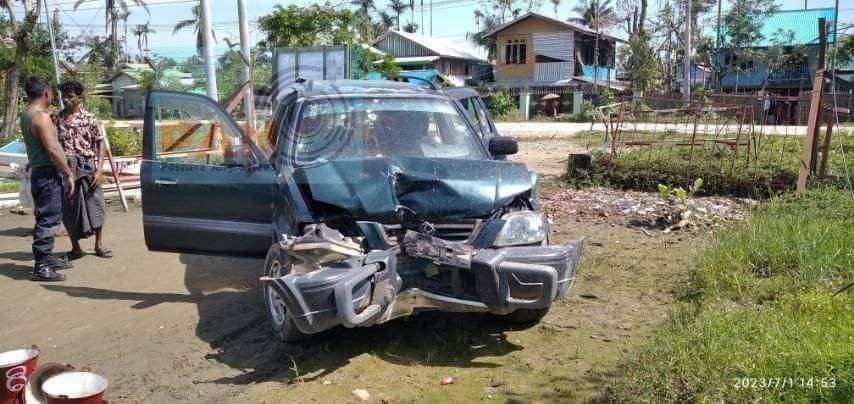Rakhine ethnic armed group the Arakan Army (AA), the armed wing of the United League of Arakan (ULA), has denied the Arakan Liberation Party (ALP)’s accusation that the AA was behind an attack in the Rakhine State capital Sittwe on July 1 that killed the party’s vice chair, a battalion commander and another member.
The ALP, a Rakhine ethnic armed group that signed the Nationwide Ceasefire Agreement (NCA) with the Myanmar government in 2015, said in a statement on July 2 that its Vice Chair Khaing Ni Yaung; Khaing Kyaw Min, commander of the Arakan Liberation Army’s Battalion 101; and Comrade Kyaw Kyaw Naing were killed at around 12:15 p.m. on July 1.
The three were returning with other ALP/ALA members from a meeting with ALP Chair Daw Saw Mra Raza Lin in Sittwe when their cars were ambushed by a group of gunmen near Sittwe University.
Sittwe residents confirmed that an attack on two cars carrying ALP troops occurred near the university.
The ALP accused the ULA/AA of carrying out the attack, which it said also left three other ALP troops injured, and condemned the attack as a “very inferior” act.
However, Khaing Thukha, the spokesperson of the ULA/AA, denied the accusation as “baseless”, saying the ULA/AA had no involvement in the attack. He implied that the ALP was facing internal dissent.
“ALP troops have been committing injustices in Sittwe, including arresting people, kidnapping and committing other crimes, constantly. Therefore, Sittwe residents feel much disaffection towards them,” Khaing Thukha told The Irrawaddy.
Therefore, he said, ordinary people may have taken revenge against the ALP.

The Irrawaddy was not able to independently verify the claim.
On Jan. 4, a car carrying General Khaing Soe Mya, the then-commander-in-chief of the ALP/ALA, and two other ALA commanders back from the junta’s Independence Day event was attacked by a group of gunmen. All three were killed on the spot.
Founded in 1967, the ALP is the oldest ethnic armed group in Rakhine State, but its popularity and influence are waning among the Rakhine community because of the group’s ties to the dictatorship. The ALP is currently engaged in peace talks with the military regime.
The ULA/AA was established in 2009 by a younger generation of Rakhine activists and has successfully established itself as an ethnic armed group, consolidating its control over much of rural Rakhine State and enjoying popular support. In contrast with the ALP, the AA has not joined the junta’s peace talks and is enjoying a surge in popularity.
Despite issuing a series of statements expressing their intention to work together in the interest of Rakhine State, the ULA/AA and ALP/ALA have yet to follow up with any meetings on how to implement these plans.
In August 2022 the ALP said in a statement that the AA had detained a member of the party’s central committee, Lieutenant Colonel Khaing Paw Lin, but the AA did not comment on the allegation.

















